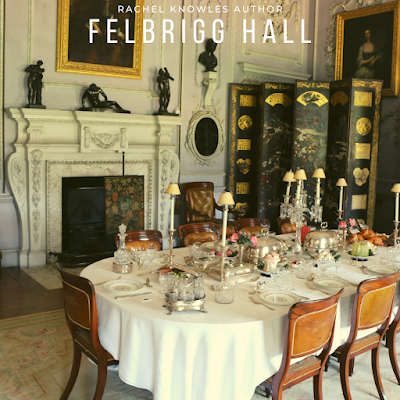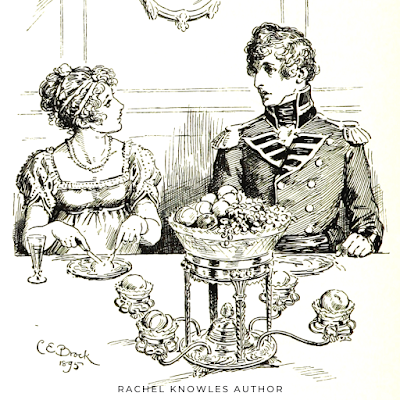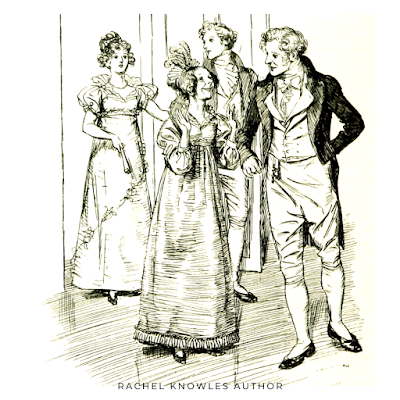 |
| A banquet at the Royal Pavilion, Brighton from the coloured lithograph by J Nash in Life in Regency and Early Victorian Times by EB Chancellor (1926) |
Did Regency people gather in the drawing room before dinner?
In Trusler’s A System of Etiquette (1804), he wrote:
When invited to dinner, make a point of always being there in proper time, not to make the company wait; fifteen minutes at least before the appointed hour, and to prevent mistakes, see that your watch goes right, and make a proper allowance for the time in going. A superior indeed, will not wait your coming beyond the time; and if you enter after the company is seated, you are a general disturber.
He continued:
On your entering the room where the company is, address yourself first to the lady of the house, next to the master, and after, to the rest of the company you are introduced to, by a respectful bow to each.1
As he then proceeded to give instructions about walking into the room where dinner is served, this suggests it was expected that the company would gather before going into the dining room.
The Pocket Book of Etiquette (1837) states that this usually took place in the drawing room:
On arriving at the house of the inviter, you will be shown into the room in which the party are assembling (ordinarily the drawing room); here, of course, you will be presented.2
This would seem to be borne out in Jane Austen’s novels. In Mansfield Park, she wrote:
Thus much was settled before Edmund, who had been out all the morning, knew anything of the matter; but when he entered the drawing-room before dinner, the buzz of discussion was high between Tom, Maria, and Mr Yates.3
 |
| Dining room, Felbrigg Hall (2019) |
I have not, as yet, come across any contemporary reference to a dinner gong, but Maria Edgeworth mentions a dinner bell in her novel Belinda (1801):
Before Belinda had answered these questions to her satisfaction, the dinner-bell rang.4
In Jane Austen’s Northanger Abbey, Elinor Tilney knows what time her father expects dinner to be served and urges Catherine Morland to hurry to the drawing room. When the company is gathered, the General calls for dinner:
Miss Tilney gently hinted her fear of being late; and in half a minute they ran downstairs together, in an alarm not wholly unfounded, for General Tilney was pacing the drawing-room, his watch in his hand, and having, on the very instant of their entering, pulled the bell with violence, ordered “Dinner to be on table directly!”5
How did guests enter the dining room?
In The Honours of the Table (1791), Trusler wrote:
In all public companies precedence is attended to, and particularly at table. Women have here always taken place of men, and both men and women have sat above each other, according to the rank they bear in life. Where a company is equal in point of rank, married ladies take place of single ones and older ones of younger ones.
When dinner is announced, the mistress of the house requests the lady first in rank, in company, to shew the way to the rest, and walk first into the room where the table is served; she then asks the second in precedence to follow, and after all the ladies are passed, she brings up the rear herself. The master of the house does the same with the gentlemen. Among persons of real distinction, this marshalling of the company is unnecessary, every woman and every man present knows his rank and precedence, and takes the lead, without any direction from the mistress or the master.6
In Pride and Prejudice, after her marriage, Lydia is anxious to assert her precedence over her eldest sister Jane:
She [Elizabeth] then joined them soon enough to see Lydia, with anxious parade, walk up to her mother’s right hand, and hear her say to her eldest sister, “Ah! Jane, I take your place now, and you must go lower, because I am a married woman.”7
Domestic Duties (1825) suggests that the host rather than the hostess takes the lead, and that the company proceeds in couples rather than all the ladies before the gentlemen:
When dinner is announced, the gentleman of the house selects the lady most distinguished by rank, or respectable by age; or the one who is the greatest stranger in the party, to lead to the dining-room…the rest of the party follow in couples.8
Illustration by Hugh Thomson
from Emma by Jane Austen (1896 edition)
How were guests seated at the table?
Describing an English dinner in 1810, Simond wrote:
The master and mistress of the house sit at each end of the table, — narrower and longer than the French tables, — the mistress at the upper end ; — and the places near her are the places of honour.9
In his 1804 book on etiquette, Trusler wrote:
Seats at table, are taken generally in the like manner, the ladies at the upper end of the table, the gentlemen at the lower; but the master or mistress of the house will sometimes direct it otherwise, and seat the ladies and gentlemen alternately, that is one gentleman and one lady, and so on, for convenience. When the men and women are so mixed, it is a mark of good manners to carve and help the ladies, to any dish that may be near you.
The mistress of the house always sits at the upper-end of her table, provided any ladies are present, and her husband at the lower-end; but, if the company consists of gentlemen only, the mistress seldom appears, in which case, the master takes the upper-seat.10
In Pride and Prejudice, Jane Austen described a dinner party at Rosings, the home of Lady Catherine de Bourgh:
The dinner was exceedingly handsome, and there were all the servants and all the articles of plate which Mr Collins had promised; and, as he had likewise foretold, he took his seat at the bottom of the table, by her ladyship’s desire, and looked as if he felt that life could furnish nothing greater. He carved, and ate, and praised with delighted alacrity.11
Later in the book, at a dinner party at Longbourn, most of the company are left to choose their own places at the table:
When they repaired to the dining-room, Elizabeth eagerly watched to see whether Bingley would take the place, which, in all their former parties, had belonged to him, by her sister. Her prudent mother, occupied by the same ideas, forbore to invite him to sit by herself. On entering the room, he seemed to hesitate; but Jane happened to look round, and happened to smile: it was decided. He placed himself by her.12
In Domestic Duties (1825), Mrs Parkes wrote:
When dinner is announced, the gentleman of the house selects the lady most distinguished by rank, or respectable by age; or the one who is the greatest stranger in the party, to lead to the dining-room, where he places her by himself. If her husband be of the party, he takes the lady of the house to her place at table, and seats himself beside her: the rest of the party follow in couples; and the hostess arranges them according to their rank, or according to what she imagines may be their expectations; always, however, placing the greatest strangers amongst the gentlemen near herself. This arrangement should be effected in an easy, gentle manner, and with as little form as possible.13
This arrangement was clearly not universal as Mrs Parkes felt the need to comment on the custom of host and hostess sitting together:
It is customary in some houses, which are regarded as fashionable, for the master and mistress to sit together at the head of the table, leaving the lower end in charge of a son, or some male relation or friend; but this custom has never been sanctioned by general usage, and is so objectionable, as far as regards the attention and comfort which every guest has a right to expect from his host, that it is not likely ever to prevail. It is true that bad health, advanced age, or accidental circumstances may place a gentleman as a guest at his own table, but when these do not exist, his appropriate situation is, certainly, at the lower end of the table.14
 |
| Elizabeth Bennet and Mr Wickham at dinner Pride and Prejudice by Jane Austen (1813) Illustration by C E Brock (1895) |
I have long held the belief that you weren’t supposed to talk to anyone apart from the person seated on your immediate right and left, but I am struggling to find this spelt out in any of the books on etiquette I have read. In smaller gatherings, it seems that general conversation was normal:
In Domestic Duties (1825), Mrs Parkes wrote:
A very large party is not likely to be so lively and sociable, as one of moderate size. A remark has somewhere been made, that a dinner party should never be less in number than the graces, nor more than the muses, but certainly more than ten or twelve in number is not desirable. When a table is very long, the conversation, witticisms and pleasantries at one end, must be lost at the other.
She continued:
The conversation must, in a great degree, however, be regulated by the host and hostess; who should be always prepared to rouse it, when it becomes heavy, or to change it, skilfully, when it is likely to turn upon subjects known to be unpleasant to any of their visitors.15
In Pride and Prejudice, at the dinner at Rosings Park mentioned above, Lady Catherine listens to Mr Collins’s conversation, even though he is seated at the far end of the table from her. Elizabeth, however, finds it hard to converse because of where she is placed:
Every dish was commended, first by him [Mr Collins] and then by Sir William, who was now enough recovered to echo whatever his son-in-law said, in a manner which Elizabeth wondered Lady Catherine could bear. But Lady Catherine seemed gratified by their excessive admiration, and gave most gracious smiles, especially when any dish on the table proved a novelty to them. The party did not supply much conversation. Elizabeth was ready to speak whenever there was an opening, but she was seated between Charlotte and Miss de Bourgh—the former of whom was engaged in listening to Lady Catherine, and the latter said not a word to her all dinner-time. Mrs Jenkinson was chiefly employed in watching how little Miss de Bourgh ate, pressing her to try some other dish, and fearing she was indisposed. Maria thought speaking out of the question, and the gentlemen did nothing but eat and admire.16
At the dinner at Longbourn also mentioned above, Elizabeth reflects on Mr Darcy’s position at the dinner table. As was due to a gentleman of his consequence, he is seated next to the hostess:
Mr Darcy was almost as far from her as the table could divide them. He was on one side of her mother. She knew how little such a situation would give pleasure to either, or make either appear to advantage. She was not near enough to hear any of their discourse, but she could see how seldom they spoke to each other, and how formal and cold was their manner whenever they did.17
In Mansfield Park, Fanny Price is invited to dinner by Mrs Grant at the parsonage. With six sat down to dinner, there seems to be only one conversation going on at the dinner table:
A very cordial meeting passed between him [Henry Crawford] and Edmund; and with the exception of Fanny, the pleasure was general; and even to her there might be some advantage in his presence, since every addition to the party must rather forward her favourite indulgence of being suffered to sit silent and unattended to. She was soon aware of this herself; for though she must submit, as her own propriety of mind directed, in spite of her aunt Norris’s opinion, to being the principal lady in company, and to all the little distinctions consequent thereon, she found, while they were at table, such a happy flow of conversation prevailing, in which she was not required to take any part—there was so much to be said between the brother and sister about Bath, so much between the two young men about hunting, so much of politics between Mr Crawford and Dr Grant, and of everything and all together between Mr Crawford and Mrs Grant, as to leave her the fairest prospect of having only to listen in quiet, and of passing a very agreeable day.18
 |
| The Dashwoods at dinner with the Middletons Sense and Sensibility by Jane Austen (1811) Illustration by Hugh Thomson (1896) |
Willoughby took his usual place between the two elder Miss Dashwoods. Mrs Jennings sat on Elinor’s right hand; and they had not been long seated, before she leant behind her and Willoughby, and said to Marianne, loud enough for them both to hear, “I have found you out in spite of all your tricks. I know where you spent the morning.”19
Did they use napkins?
Domestic Duties (1825) states:
When, according to the continental fashion, the cloth is allowed to remain on the table; or, according to the more general custom of this country, before it is removed, a silver, or a china or glass dish, containing rose-water, is passed round the table, into which each guest dips the corner of his table napkin, for the purpose of refreshing his mouth and fingers, prior to the appearance of the dessert.20
Earlier, in 1810, Simonds observed that sometimes the tablecloth was used instead of a napkin:
Towards the end of dinner, and before the ladies retire, bowls of coloured glass full of water are placed before each person. All (women as well as men) stoop over it, sucking up some of the water, and returning it, often more than once, and, with a spitting and washing sort of noise, quite charming,— the operation frequently assisted by a finger elegantly thrust into the mouth! This done, and the hands dipped also, the napkins, and sometimes the table-cloth, are used to wipe hand and mouth.21
When was dinner over?
It was polite for the host or hostess of a dinner party to keep eating as long as any of their guests. Trusler wrote in The Honours of the Table (1791):
The master or mistress of the table should continue eating, whilst any of the company are so employed, and to enable them to do this, they should help themselves accordingly.22
Did the children of the house join the company after dinner?
This must have been a custom in the circles in which Jane Austen moved. In Emma, she described a dinner party at the Coles’s:
She [Emma] said no more, other subjects took their turn; and the rest of the dinner passed away; the dessert succeeded, the children came in, and were talked to and admired amid the usual rate of conversation.23
Similarly, in Sense and Sensibility:
Lady Middleton seemed to be roused to enjoyment only by the entrance of her four noisy children after dinner, who pulled her about, tore her clothes, and put an end to every kind of discourse except what related to themselves.24
If you have enjoyed this blog and want to encourage me and help me to keep making my research freely available, please buy me a virtual cup of coffee by clicking the button below.
Notes
Trusler, Rev Dr John, A System of Etiquette (1804).
Freeling, Arthur, The Pocket Book of Etiquette (Liverpool, 1837).
Austen, Jane, Mansfield Park (1814).
Edgeworth, Maria, Belinda (1801).
Trusler, John, The Honours of the Table, or, rules for behaviour during meals (1791).
Austen, Jane, Pride and Prejudice (1813).
Parkes, Mrs William, Domestic Duties or Instructions to young married ladies on the management of their households (London, 1825).
Simond, Louis, Journal of a Tour and Residence in Great Britain, during the years 1810 and 1811 (1815).
Trusler, Rev Dr John, A System of Etiquette (1804).
Austen, Jane, Pride and Prejudice (1813).
Ibid.
Parkes op cit.
Ibid.
Ibid.
Austen, Jane, Pride and Prejudice (1813).
Ibid.
Austen, Jane, Mansfield Park (1814).
Austen, Jane, Sense and Sensibility (1811).
Parkes op cit.
Simond op cit.
Trusler, John, The Honours of the Table, or, rules for behaviour during meals (1791).
Austen, Jane, Emma (1815).
Austen, Jane, Sense and Sensibility (1811).
Sources used include:
Austen, Jane, Jane Austen's Letters, Collected and Edited by Le Faye, Deirdre (Oxford University Press, 1995)
Austen, Jane, Mansfield Park (1814)
Austen, Jane, Northanger Abbey (1817)
Austen, Jane, Pride and Prejudice (1813)
Austen, Jane, Sense and Sensibility (1811)
Austen, Jane, The Letters of Jane Austen selected from the compilation of her great nephew, Edward, Lord Bradbourne ed Sarah Woolsey (1892)
Cruickshank, Dan and Burton, Neil, Life in the Georgian City (1990)
Edgeworth, Maria, Belinda (1801)
Espriella, Don Manuel Alvare, Letters from England, translated from the Spanish by Robert Southey 3rd edition (1814) Volume 1
Freeling, Arthur, The Pocket Book of Etiquette (Liverpool, 1837)
Parkes, Mrs William, Domestic Duties or Instructions to young married ladies on the management of their households (London, 1825)
Simond, Louis, Journal of a Tour and Residence in Great Britain, during the years 1810 and 1811 (1815)
Trusler, Rev Dr John, A System of Etiquette (1804)
Trusler, John, The Honours of the Table, or, rules for behaviour during meals (1791)
All photographs © Regencyhistory.net



No comments:
New comments are not allowed.